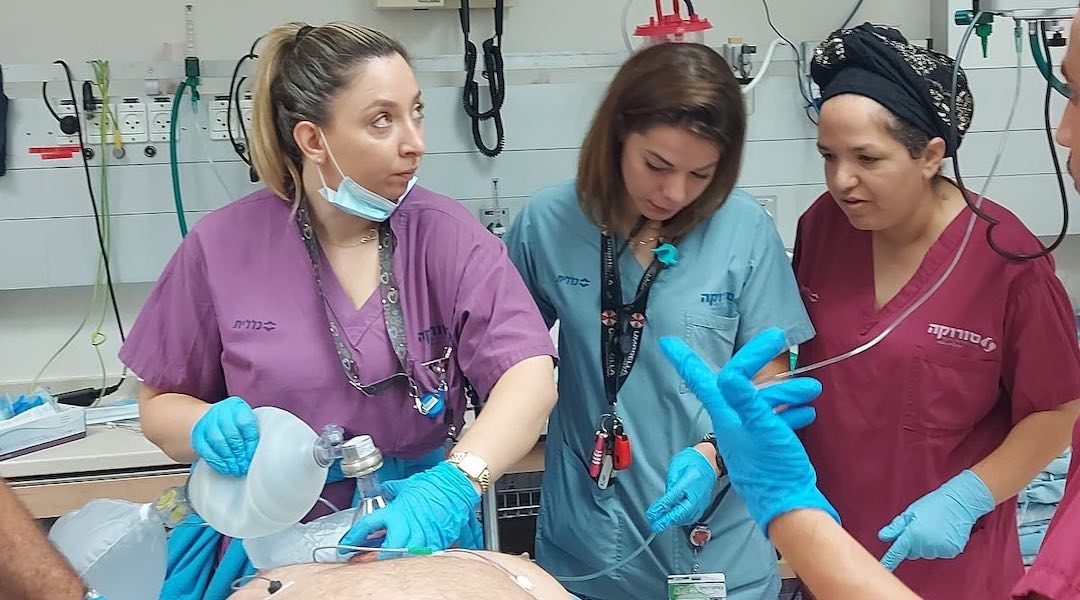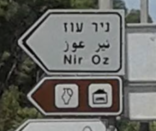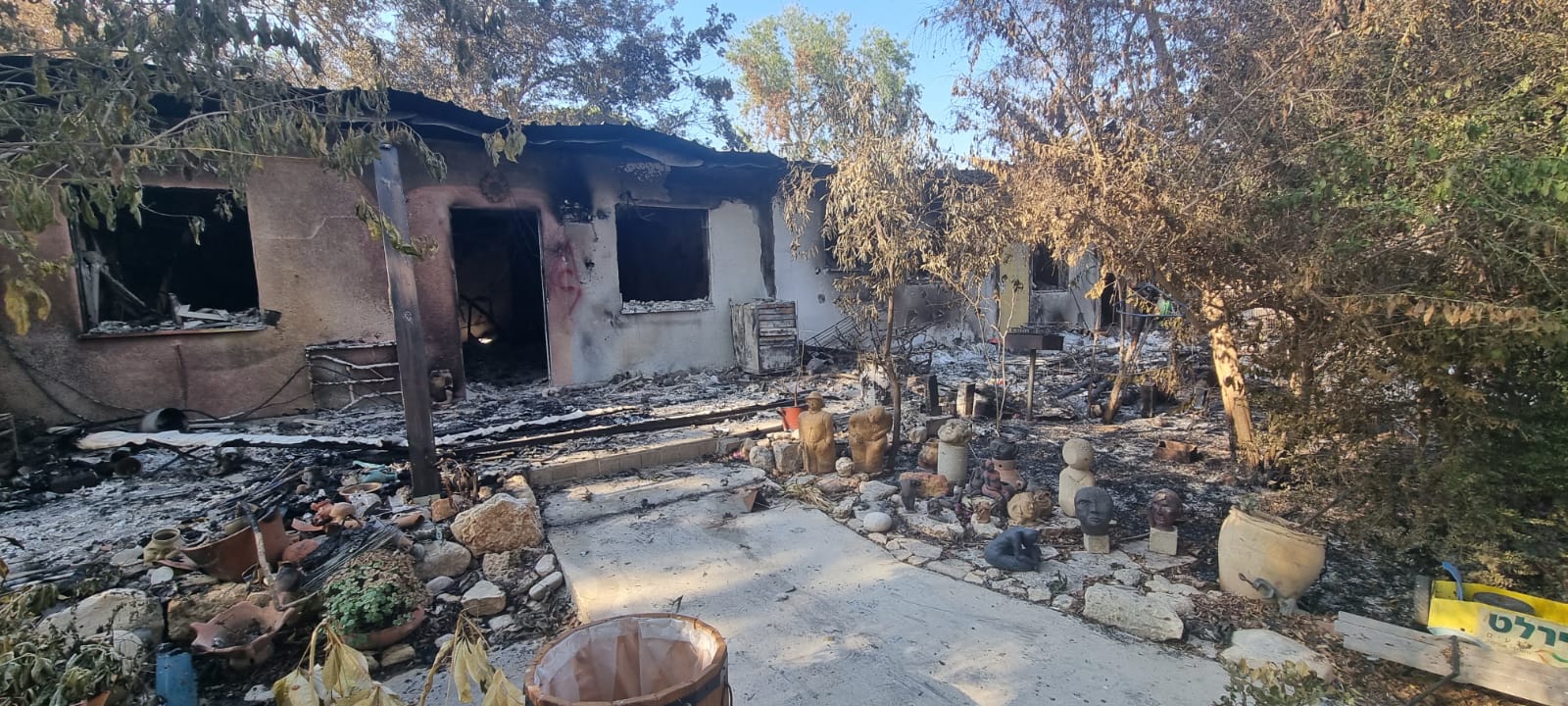Neomit Dekel-Chen, 63, has been a resident of Kibbutz Nir Oz for the last 30 years. This is her account of what happened on Oct. 7, when Hamas attacked her kibbutz and others near the border of Gaza. Dozens of Nir Oz residents were murdered and dozens more were taken hostage during the assault.
This account is adapted from Dekel-Chen’s account to Ynet, an Israeli Hebrew-language news site.
(JTA) — After a half hour of nonstop red-alert sirens and incoming missiles, we started receiving messages that Hamas terrorists were everywhere in the kibbutz. My son, Sagi, who is still missing, wrote to me that there were two terrorists walking around near the clinic. Afterwards he sent me another message about two more terrorists on a motorbike.
Sagi told me to lock my door, which I did, and I went into the security room alone. I heard all around people speaking Arabic; they had entered my house, they were breaking everything. I crept into a bed-linen chest. My daughter-in-law wrote to me that there were terrorists in her house; I wrote back that they were in my house, too. We understood then from others that they were starting to set the houses on fire, and that we should put wet towels at the threshold of the security room door.
Once I heard them leave my house, I got out of the linen chest to quickly get a bottle of water and returned to the security room. I locked myself in. But more and more smoke was seeping in. I opened the window of the room, but the pergola was on fire. I closed the window – then the whole room started filling up. I ran out and saw a neighbor who had shot two terrorists.
I thought this was my chance to escape, but I was wrong. They captured me.
They caught my neighbor too. I was barefoot and they held me tight so I wouldn’t flee. I don’t understand a word of Arabic but I understood they were telling me not to try and run away. They led me barefoot in the direction of the fields, to the back gate of the kibbutz, toward Gaza. Along the way I saw houses in flames, and I understood no one was going to get out of those burning houses alive. I had left my house to save myself.
We walked for about 150 meters on the road toward Gaza. I saw the terrorists walking with their loot, bulging suitcases, televisions, electric wagons used by elders. They had taken everything. I was with a neighbor who told me they had killed her son and taken her husband. I told her we would stay together and see what to do next. About 150 meters later, a tuktuk vehicle pulling an open cart stopped beside us. In the cart there were five people, all from the kibbutz. My good friend was there with three little girls, two of them only 3 years old; they were crying, looking lost.
They continued to drive with us in the back, toward Gaza, when an IDF helicopter appeared above us. At some point the helicopter shot at the terrorists, the driver and the others. There was screaming in the tuktuk.
All the terrorists were dead and we were alive, except for one for one of the women with us. She had died in the arms of her daughter, who had come to the kibbutz to visit and now would not leave her mother. I took one of the little girls in my arms, another friend took a second little girl and we started running towards the fields. There was a young couple with us with twin girls, but only one of them was in the cart. They, too, started running with us. We called out to the woman whose mother had been shot that she should flee with us, because her mother was dead. She kept weeping: “Mama died in my arms, and I didn’t protect the girls.”

Staff at the Soroka Medical Center in Beersheva tend to patients wounded in the Oct. 7 attack by Hamas in southern Israel, Oct. 9, 2023. (American Friends of Soroka Medical Center)
We were 50 meters into the fields when I was hit with shrapnel in my head, knee and back. I was bleeding. I lay down on the ground and a tractor showed up. It was my tractor, the one I work with. There were terrorists on it. They saw us and started coming toward us to put us on the tractor and take us with them. I said to myself that it was now or never; I decided to play dead — and they didn’t take me. They ignored me. They took the three little girls, the parents of the twin girl, everyone who was there and still alive. They took them all to Gaza.
More terrorists in more cars drove by, loaded with the things they had looted. The IDF helicopter was overhead. I tried to signal to them that I was alive; I tried to move forward. Every time more terrorists drove by, I played dead again, which I could do as I was covered in blood. At noon it was hot and I drank water from the field irrigation pipes. I continued toward a row of tamarisk trees. I know all the roads in the fields. I lifted up my head and saw the kibbutzim in flames — Magen, Nir Oz and Nirim. They were all burning.
Even though I didn’t know if there was anywhere to return to, I kept telling myself I had to reach my children and see what had happened to them. I have two children and four grandchildren. That is what kept me going.
I crept for two hours through the fields and I finally managed to reach my kibbutz. I searched for a place that wasn’t on fire. I couldn’t feel my legs anymore. On the way I saw ruin everywhere, massive destruction.
There are no words to describe the pogrom. Everything was burnt, broken; there were no houses left. The wooden houses had been consumed by flames and only the metal security rooms were still standing. Terrible sights. I reached my daughter’s house which wasn’t burned. I pounded on the door but they wouldn’t open it. I shouted: “Ofir, it’s Ima,” and still they didn’t open because they thought it was terrorists.
Finally, they opened the door and I fell onto the mattress in the room. I was bleeding everywhere. And from that moment I’m just waiting to hear something about my son who is still missing.
I told them to let everyone know I was alive. Later, rescue forces arrived and tended to me and evacuated me to Soroka Hospital in Beersheba. It took them hours to arrive. When I got back to the kibbutz at 1:30, the army had still not arrived; everything had started at 6:30, and seven hours later, still no soldiers had shown up. I walked to my house terrified terrorists would shoot me in the back. I was determined to find my children.
It was my war of survival, to reach my children and grandchildren. The kibbutz is completely destroyed. There is nowhere to return to, no starting point for rebuilding. I can’t stop wondering how we reached this situation. How?
My heart is with those who stayed on the tractor. But I had to save myself and reach my children.
JTA has documented Jewish history in real-time for over a century. Keep our journalism strong by joining us in supporting independent, award-winning reporting.







